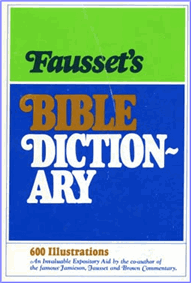Fausset's Bible Dictionary
A B C D E F G H I J K L M N O P Q R S T U V W X Y Z
Abba
The Chaldaic-Hebrew form, as ab is the Hebrew form, for the Greek pater, "father." Instead of the definite article which the Hebrew uses before the word, the Chaldee or Aramaic adds a syllable to the end, producing thus the emphatic or definitive form. It is used to express a vocative case, and therefore is found in all the passages in which it occurs in the New Testament (being in all, an invocation): Mark 14:36; Romans 8:15; Galatians 4:6.
The use of the Hebrew and of the Greek appellation addressed to the one Father beautifully suggests that the Spirit of adoption from Jesus, who first used the double invocation, inspires in both Jew and Gentile alike the experimental knowledge of God as our Father, because He is Father of Jesus with whom faith makes us one, and as our God because He is Jesus' God. Compare John 20:17, "ascend unto My Father and (therefore) your Father. and to My God and (therefore) your God"; Galatians 3:28, "there is neither Jew nor Greek, for ye are all one in Jesus Christ"; Ephesians 2:18, "through Him we both have access by one Spirit unto the leather." (Especially (See ABADDON above.) "Abba" was a title not to be used by slaves to a master, nor Imma to a mistress, only by children: see Isaiah 8:4. "Before the child shall have knowledge to cry Abi, Immi."
Bibliography Information
Fausset, Andrew Robert M.A., D.D., "Definition for 'abba' Fausset's Bible Dictionary".
bible-history.com - Fausset's; 1878.
Copyright Information
© Fausset's Bible Dictionary
Fausset's Bible Dictionary Home
Bible History Online Home
Bible Encyclopedia (ISBE)
Online Bible (KJV)
Naves Topical Bible
Smith's Bible Dictionary
Easton's Bible Dictionary
Schaff's Bible Dictionary
Fausset's Bible Dictionary
Matthew Henry Bible Commentary
Hitchcock's Bible Dictionary

Dr. A.R. Fausset
Popular and Trending:
Meaning and definition of fasting, what is fasting in the bible, fasting definition, why should I fast, the power of prayer and fasting, Location of Galilee, where was galilee in the bible?, fasting definition, Galilee region, cities of Galilee, Sea of Galilee, Definition of biblical fire, what is fire in the bible?, fire and brimstone, fire meaning, baking bread with fire, Definition of the biblical firmament in Genesis, what is the firmament in the bible?, was the firmament the third heaven, firmament meaning, did the firmament bring the flood of Noah?.
